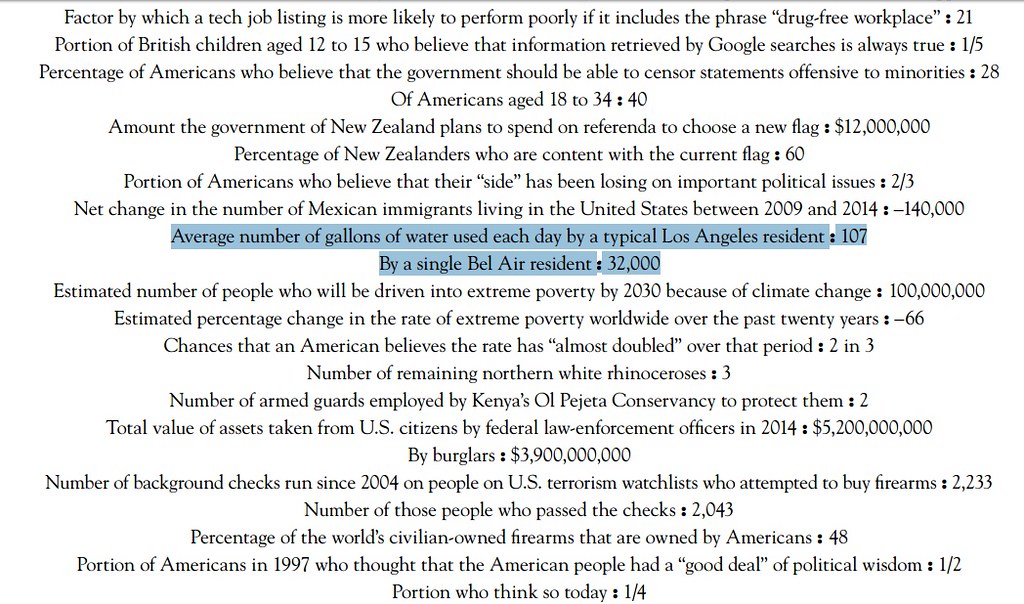Study Results?
As I mentioned, in a brief article from the online journal 'Laboratory Equipment' titled "Water Usage More Efficient in U.S. Cities, More Wasteful in Rural America" the results of water usage across America were published. Here is the excerpt which caught my eye shown below:
The water waste was also tied to less education, and more poverty, they found.Urban environments apparently improved their water use per person through efficiency technologies, and by retrofitting existing systems.“There may be a role for huge infrastructure projects at some point, but these findings underscore the value of focusing on efficiency measures – and the need to pursue those measures in rural counties,” said Arumugam.It is unclear whether agriculture in the rural areas could drive some of the increased per-capita consumption.“Basic human needs” dictate between 15 and 25 gallons of water per day for a person, according to experts. But that amount is far exceeded by the average American, who uses 90 gallons daily.
I could not help myself wondering more about the study after reading the excerpt shown above. Here is the original manuscript (pre-print) - click here. The report cites beneficial changes to improve efficiency - lower consumption as the following:
1) Education
2) Fines for excessive use
3) Infrastructure changes
The last change is an obvious change which can occur at the local level (municipal) and result in major savings to the daily amount of water use. Whereas the first and second are not so easily answered which is the reason for the report. The authors set out to answer the following questions:
1) First, how does the water withdrawals and water-use efficiency vary spatio-temporally, and do these finer-grained spatio-temporal patterns reflect underlying spatio-temporal variations in hydroclimate and population growth?
2) Second, how do socio-economic factors affect efficiency across the country?
3) Finally, can we attribute the finer-grain efficiency to institutional and infrastructural factors – federal investment in water infrastructure, water conservation measures, and type of storage systems (i.e., within-year/over-year reservoirs) – across the country?
In order to answer the three questions above, an army of researchers and data compilers would be needed. The report was completed and worth reading. When I first read the excerpt about factors like "education" and "poverty" which were tied to increased water use (i.e. water waste) I was rather surprised. Here is why - below.
Education Cannot Be Tied To Water Use
Yes, you read the heading correctly to this section. You might wonder where my evidence is which validates this statement. First, I would say that I live in California and we have been in "drought conditions" for quite a while. One estimate from a previous blog that I wrote estimates that in order to be fully restored as a state, we would need around 14 trillion gallons of water -- enough to fill the Dallas Cowboys stadium around 14,000 times -- WOW.
In light of that, educating the community on water use and waste is an extremely important measure that local municipalities can invest heavily in. Although, in any given community, there will be "educated" people who do not care about the "drought" and will waste water.
You might ask: Who are these water wasters/"drought deniers"?
Great question. In the report above, the national average use of water per day per resident is around 90 gallons per day. Yes, each of us roughly use around 90 gallons of water per day. In a previous post, I found an astonishing statistic which blew my mind and would blow the authors of the above minds too. Here is the statistic shown below from the blog post:
If you focus in on the highlighted region the following statistic appears:
"Average number of gallons of water used each day by a typical Los Angeles resident: 107
By a single Bel Air resident: 32,000"
Yes, you read that statistic correctly. The average Los Angeles resident uses close to the national average of water per day. Whereas the average Bel Air resident uses around 32,000 gallons per day -- OMG. Right? Where is all that water going to? I have no idea but maybe to water their lawns, fill their multiple water fountains up, swimming pools, etc.
You can now see my surprise when I first read the result of the above report which stated that education and poverty were tied to water waste. I would tend to agree to an extent. Although, the results from my blog post state a different result.
Furthermore, if the Los Angeles Water District imposes fines on the residents of Bel Air -- most would proudly pay the fine. Thousands of dollars is pennies compared to the millions each are bringing in. I hope that the authors of the above report decided to include Bel Air residents.
Imposing a fine on the wealthy might or might not make a difference in water use. For low income residents, the change is dramatic. When each of us read a report, we should keep in mind all of the information. Results from my previous blog suggest that this is relevant in the present case.
Conclusion...
Water use is important for each of us. Education and poverty can play a role in water efficiency. But if we choose not to learn about the water sources or system in our municipalities, then change will not occur. I always try to emphasize how important the realization is of the source of our clean (drinkable) water is. When each of us examine more closely the source of our water and the avenues by which water is process to arrive at our faucet, maybe each of us would respect and be more conservative in our consumption. We do not want another Flint Michigan disaster. Each of us deserve clean drinkable water. Think about how much water you use on a daily basis. How does your consumption compare to the national average?
Until next time, have a great day!

No comments:
Post a Comment